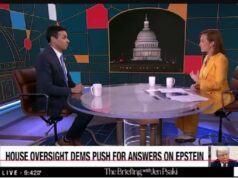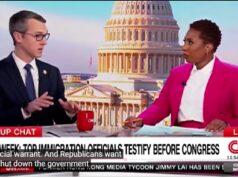I’ve always had a very high regard for Laurence Tribe, Professor of Constitutional Law at Harvard University. Some years back, I was hoping that he would be appointed to fill a vacancy on the Supreme Court.
And, in view of the fact that Professor Tribe has just now co-authored a book To End a Presidency: The Power of Impeachment, it seems safe to assume that this brilliant legal mind has given the question of whether or not Trump should be impeached (in the event that the coming election hand control over the House of Representatives to the Democrats) a good deal of thought.
Nonetheless, I find Professor Tribe’s apparent conclusion not only weak but deeply wrong-headed.
What that conclusion is can be inferred from the subtitle that Slate’s legal reporter, Dahlia Lithwick, gives to her interview of Tribe: “Why Democrats shouldn’t impeach Donald Trump if they win the House.”
[Note: I have read the interview but not the book.]
So the issue is not whether it is politically wise for the Democrats to campaign this year on the issue of impeachment. What Tribe is addressing, rather, is what to do – or not to do – if the Blue Wave does give the Democrats control of the House, the chamber where the impeachment process must begin.
(Neither Tribe nor I believe that impeachment is a useful campaign issue. I would say that the I-word for this year’s campaigns should instead be “Investigation.” It is once the findings of Mueller’s investigation are publicly released that the other I-word — impeachment — should move to the center of the national conversation.)
Nor is the issue, for Tribe, whether Donald Trump has committed impeachable offenses. On whether Trump has committed “high crimes and misdemeanors,” Tribe says, “I think as the evidence come in it will be very clear to people who are willing to look at the evidence that he has.”
But then, he says, we face the real problem, which is “what to do with that.”
The Alleged Danger of an Acquittal
Tribe thinks that the House impeaching Trump would be a mistake because it would presumably be impossible to get the two-thirds vote to convict in the Senate. “It just doesn’t make sense,” Tribe says, to “go ahead and impeach no matter what the results will be, even if we know there aren’t going to be 67 senators to convict, even if we know that the person we impeached is going to run around and claim victory saying again, ‘No collusion, no obstruction. See I was acquitted.’”
Tribe cites, in that regard, what happened when Clinton, who was impeached by the House, and then “was vindicated in the Senate. He emerged with the highest popularity numbers he’d had in a very long time. He was emboldened. He was strengthened.”
The first problem with Tribe’s argument is that what Clinton was charged with was completely trivial compared with the charges that can reasonably be foreseen that Trump would face (as outlined presumably in the report from the Mueller investigation). Whereas Clinton’s misdeeds had nothing to do with the performance of the office with which he was entrusted, Trump’s high crimes and misdemeanors go to the heart of a President’s responsibilities.
That vast difference surely means that the majority of the public would regard the charges, the trial, and an acquittal quite differently from how majority public opinion regarded the Clinton impeachment. Sympathy for the acquitted (unfaithful husband) Clinton would not be replicated for an acquitted (corrupt, lawless, possibly treasonous) Trump.
For such reasons, Tribe’s expectation that a failed effort to remove Trump would fortify Trump as Clinton’s acquittal did for him seems quite implausible.
But aside from the implausibility of that implausible “cost” of an acquittal strengthening Trump, there is also Tribe’s apparent failure to recognize the likely significant benefit even of a trial that fails to convict.
Even if we grant that the Republicans could muster the 34 votes to acquit, they nonetheless would lack the power to prevent a trial. And that trial — in itself — could provide America with precisely what it needs.
The vital role such a trial could play — even that trial does not remove this disastrous President from office — will be the topic of the second part of this piece, appearing here soon.



![Video: Rep. Suhas Subramanyam (D-VA10), Who Was in the Room for Ghislaine Maxwell Deposition, Says She Was “robotic,” “unrepentant,” a “monster [who] should be behind bars forever”](https://bluevirginia.us/wp-content/uploads/2026/02/suhas0209-238x178.jpg)







![Video: Ivy Main Says “the hostility to offshore wind is really just [Trump]; nobody else feels this way…he will be gone and then we will get back on track”](https://bluevirginia.us/wp-content/uploads/2026/02/axiosivymain-100x75.jpg)
